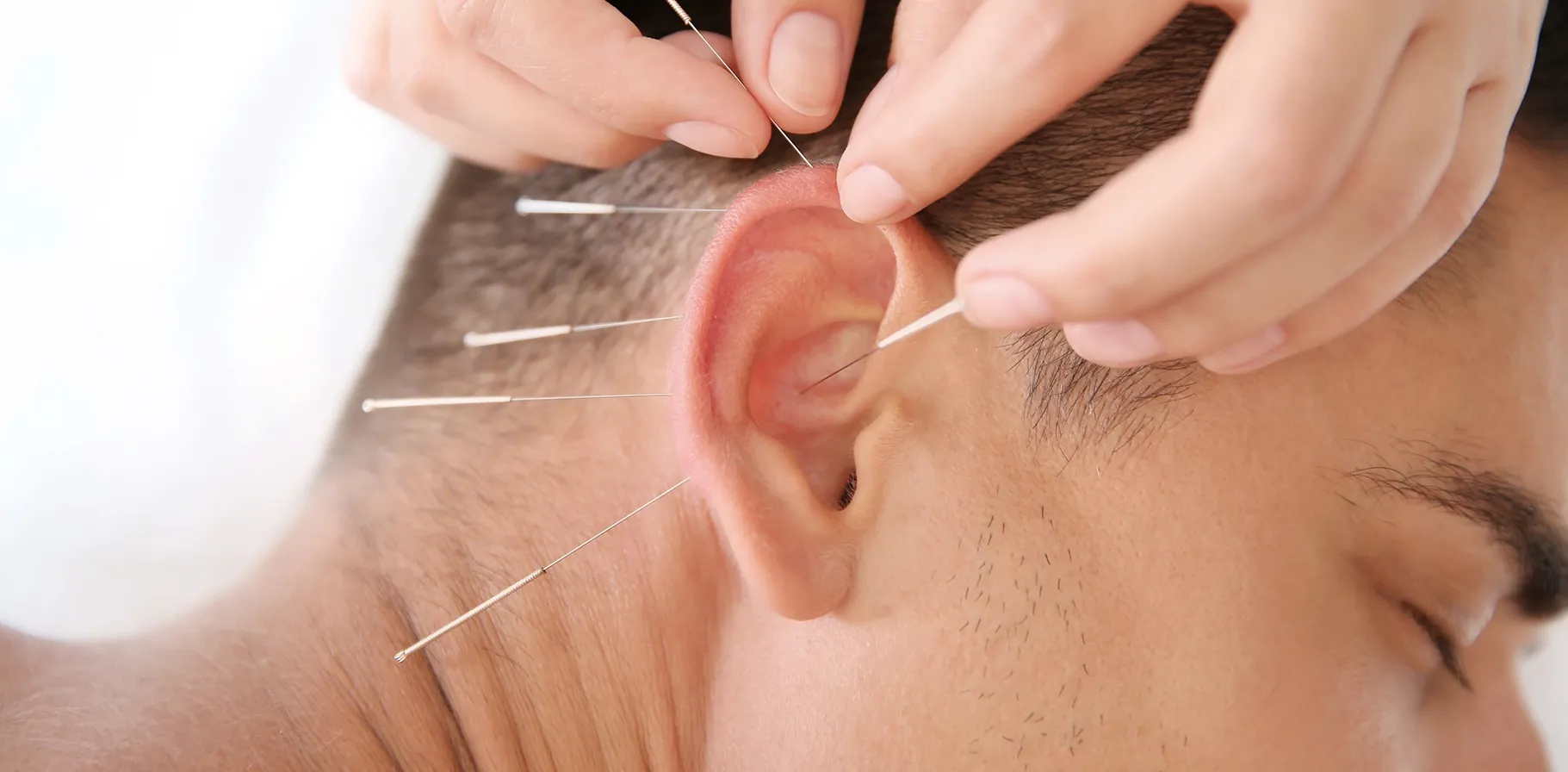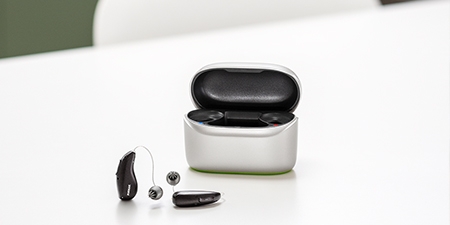Ear Acupuncture: Tiny Needles, Big Benefits

Ear Acupuncture: Tiny Needles, Big Benefits
15 min.
Published August 11, 2025
Acupuncture is an ancient holistic practice that originated in China more than 2,500 years ago. It is based on the concept of vital energy, known as Qi (“chee”), flowing through the body along meridians or pathways. Acupuncture involves inserting thin needles at specific points along these meridians to stimulate and rebalance the body's energy flow, promoting overall health and well-being. While the traditional Chinese medicine practice mainly focuses on full-body acupuncture, there's a lesser-known branch called ear acupuncture, or auricular acupuncture, which targets specific points on the ear. This article will explore the world of ear acupuncture and its purposes.
A Brief Overview of Acupuncture and Acupressure
Before delving into ear acupuncture, let's take a more general look at acupuncture and its close cousin, acupressure.
Ear Acupuncture and Its Points
Ear acupuncture, or auricular acupuncture, is a specialized form of acupuncture that focuses exclusively on the external ear. In this practice, the ear is considered a microsystem that reflects the entire body. The ear contains numerous acupuncture points corresponding to specific organs, functions, and body parts. These points can be stimulated with fine needles, small beads, or ear seeds (see below) to address various health concerns.
One of the primary acupuncture points on the ear is known as Shen Men, which is located in the center of the ear's upper portion. Shen Men is often targeted for its calming and stress-relief properties. Additionally, the ear houses points that correspond to the heart, lungs, digestive system, and other vital organs and systems.
What Does Ear Acupuncture Do?
Ear acupuncture is employed for a wide range of purposes: here are some of the key functions²:
What Are Ear Seeds in Acupuncture?
Ear seeds, or ear pellets, are commonly used in ear acupuncture as an alternative to needles. They are tiny seeds or beads placed on specific acupuncture points on the ear and secured with adhesive tape. These seeds apply a continuous pressure to the points, allowing for long-term stimulation without the need for repeated needle insertions. Ear seeds are convenient and discreet, making them a popular choice for those who wish to continue treatment at home or in their daily lives.
Does Ear Acupuncture Hurt?
One of the advantages of ear acupuncture is that it is generally considered to be a painless procedure. The needles used are extremely thin, and the insertion is done gently to minimize discomfort. Many people report only a mild sensation or a slight tingling during treatment. Ear seeds, being non-invasive, do not cause any pain at all.
How Often Can You Have Ear Acupuncture?
The frequency of ear acupuncture sessions can vary depending on the individual and the specific condition being treated. In some cases, a single session may provide the desired results, while others may require multiple sessions. A qualified acupuncturist will assess your needs and recommend an appropriate treatment plan. For ongoing issues, such as chronic pain or stress management, regular sessions may be necessary.
Who Performs Ear Acupuncture?
It is essential to have ear acupuncture performed by a trained and licensed acupuncturist. These professionals have the knowledge and experience to accurately locate and stimulate the appropriate ear acupuncture points, ensuring the best results while minimizing potential risks. It is not recommended to attempt ear acupuncture on your own, especially if you are unfamiliar with the practice.
Does Ear Acupuncture Work?
The effectiveness of ear acupuncture, like traditional body acupuncture, has been a topic of interest and research for many years. While there is still ongoing debate, a growing body of evidence suggests that ear acupuncture can be beneficial for various health concerns. It is essential to keep in mind that individual responses can vary, and not all conditions will respond equally to this treatment. Scientific studies have shown promising results in areas such as pain relief and management, stress reduction, and addiction treatment. As with any alternative therapy, it is advisable to consult with a healthcare professional before starting ear acupuncture to determine if it is a suitable option for your specific needs.
Are There Side Effects of Ear Acupuncture?
Ear acupuncture, like traditional acupuncture, is generally considered safe when performed by a qualified and licensed practitioner. However, like any medical or therapeutic intervention, there can be potential side effects or adverse reactions, though they are typically mild and temporary. Here are some of the possible side effects associated with ear acupuncture:
- Slight Discomfort - Some individuals may experience mild discomfort or a slight sensation when the needles are inserted into the ear. However, this discomfort is typically short-lived and should not be painful.
- Bleeding or Bruising - In rare cases, there may be minimal bleeding or bruising at the site where the needles were inserted. This is more likely to occur in individuals with bleeding disorders or those taking blood-thinning medications.
- Infection - While the risk of infection is minimal, it is essential to ensure that the practitioner uses sterile, disposable needles for every treatment session to prevent the introduction of infections.
- Allergic Reactions - Some individuals may be sensitive or allergic to the materials used in adhesive tape or ear seeds. If you have known allergies, it's important to discuss them with your practitioner before starting ear acupuncture.
- Fainting or Dizziness - Occasionally, some people may feel lightheaded or experience dizziness during or after an acupuncture session. This can be related to various factors, including anxiety or an empty stomach. To prevent this, it's advisable to eat a light meal before your appointment and inform your acupuncturist if you are prone to dizziness.
- Unwanted Effects - In some cases, individuals may experience unwanted effects if specific ear acupuncture points are stimulated incorrectly or excessively. For example, stimulating points related to appetite control may lead to changes in appetite, which may or may not align with the patient's goals.
- Aggravation of Symptoms - In rare instances, ear acupuncture may initially exacerbate symptoms before improving them. This can be part of the healing process, but it's important to communicate with your practitioner if you notice this happening.
It's crucial to keep in mind that side effects are relatively uncommon and are often mild when they do occur. The safety of ear acupuncture largely depends on the qualifications and expertise of the practitioner, the use of sterile needles and equipment, and the accurate identification of acupuncture points. Before starting ear acupuncture or any form of acupuncture, consult with a licensed acupuncturist and discuss your medical history and any concerns you may have to ensure a safe and beneficial experience.
Additionally, if you experience severe or long-lasting side effects or discomfort during or after an ear acupuncture session, it is essential to seek immediate medical attention and inform your acupuncturist about your experiences for future sessions' adjustments.
Summary
Ear acupuncture is a fascinating and effective branch of traditional Chinese medicine that has gained popularity for its ability to address various health concerns, including pain management, stress reduction, and more. The ear's intricate network of acupuncture points can be stimulated using fine needles or ear seeds, and the practice is generally painless. While ear acupuncture can offer numerous benefits, its effectiveness may vary from person to person. To ensure a safe and successful experience, it is crucial to seek the expertise of a licensed acupuncturist who can tailor the treatment to your individual needs. If you are considering ear acupuncture, consult with a healthcare professional to explore whether it is a suitable option for you, and always prioritize your well-being and overall health.
References
¹ Lee, M. S., Shin, B. C., & Ernst, E. (2009). Acupuncture for acute low back pain: a systematic review. The Clinical Journal of Pain, 25(2), 172-185.
² Garner B.K., et al. (2018). Auricular Acupuncture for Chronic Pain and Insomnia: A Randomized Clinical Trial. Med Acupunct.1;30(5):262-272. doi: 10.1089/acu.2018.1294. Epub 2018 Oct 15. PMID: 30377462; PMCID: PMC6205765.




